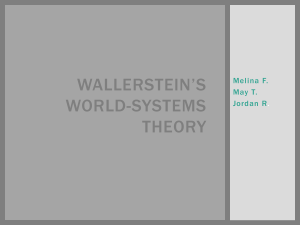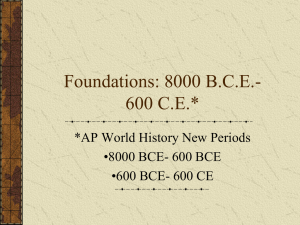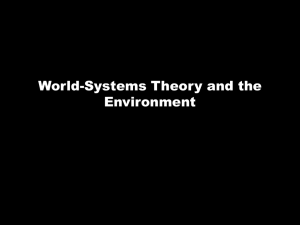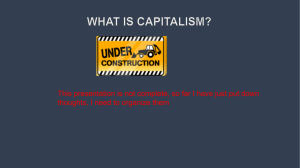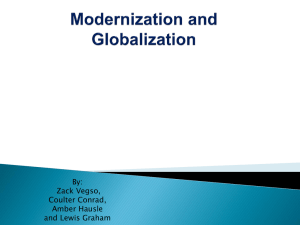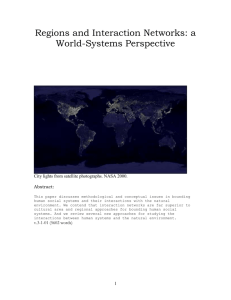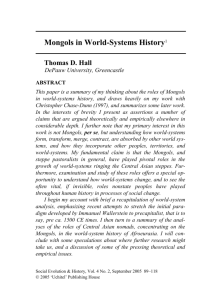Derluguian, Georgi - The Political Economy of the World
advertisement
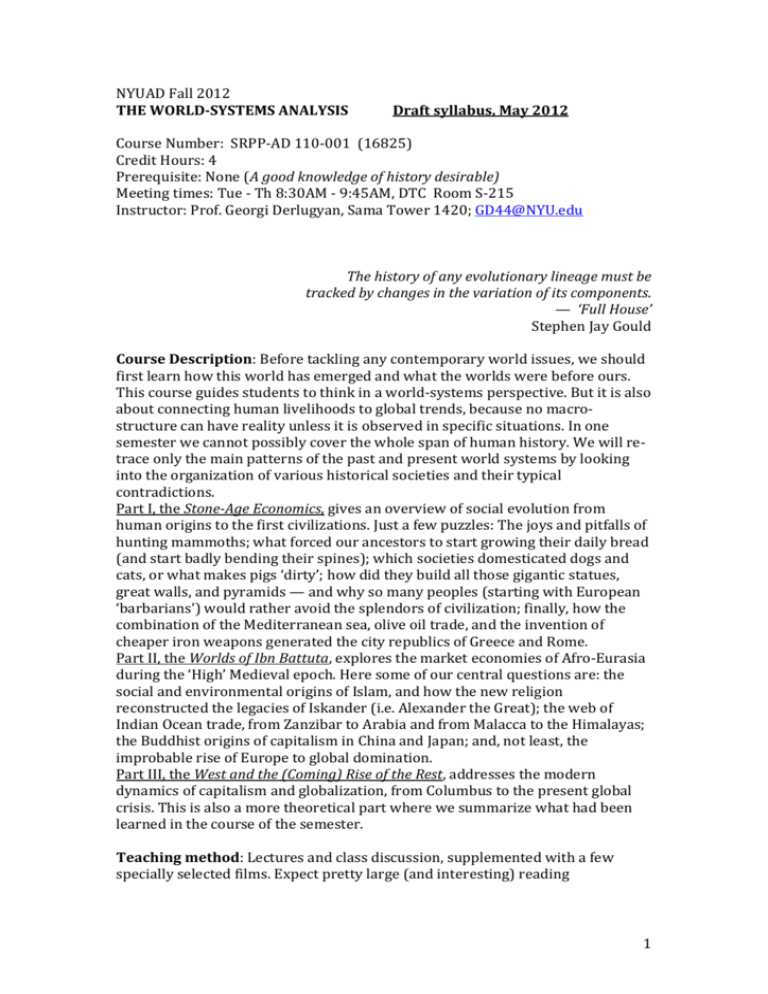
NYUAD Fall 2012 THE WORLD-SYSTEMS ANALYSIS Draft syllabus, May 2012 Course Number: SRPP-AD 110-001 (16825) Credit Hours: 4 Prerequisite: None (A good knowledge of history desirable) Meeting times: Tue - Th 8:30AM - 9:45AM, DTC Room S-215 Instructor: Prof. Georgi Derlugyan, Sama Tower 1420; GD44@NYU.edu The history of any evolutionary lineage must be tracked by changes in the variation of its components. — ‘Full House’ Stephen Jay Gould Course Description: Before tackling any contemporary world issues, we should first learn how this world has emerged and what the worlds were before ours. This course guides students to think in a world-systems perspective. But it is also about connecting human livelihoods to global trends, because no macrostructure can have reality unless it is observed in specific situations. In one semester we cannot possibly cover the whole span of human history. We will retrace only the main patterns of the past and present world systems by looking into the organization of various historical societies and their typical contradictions. Part I, the Stone-Age Economics, gives an overview of social evolution from human origins to the first civilizations. Just a few puzzles: The joys and pitfalls of hunting mammoths; what forced our ancestors to start growing their daily bread (and start badly bending their spines); which societies domesticated dogs and cats, or what makes pigs ‘dirty’; how did they build all those gigantic statues, great walls, and pyramids — and why so many peoples (starting with European ‘barbarians’) would rather avoid the splendors of civilization; finally, how the combination of the Mediterranean sea, olive oil trade, and the invention of cheaper iron weapons generated the city republics of Greece and Rome. Part II, the Worlds of Ibn Battuta, explores the market economies of Afro-Eurasia during the ‘High’ Medieval epoch. Here some of our central questions are: the social and environmental origins of Islam, and how the new religion reconstructed the legacies of Iskander (i.e. Alexander the Great); the web of Indian Ocean trade, from Zanzibar to Arabia and from Malacca to the Himalayas; the Buddhist origins of capitalism in China and Japan; and, not least, the improbable rise of Europe to global domination. Part III, the West and the (Coming) Rise of the Rest, addresses the modern dynamics of capitalism and globalization, from Columbus to the present global crisis. This is also a more theoretical part where we summarize what had been learned in the course of the semester. Teaching method: Lectures and class discussion, supplemented with a few specially selected films. Expect pretty large (and interesting) reading 1 assignments each week, plus three test essays (8-10 pages each) corresponding to the three parts of the course. Participation in class discussion is expected. Intended learning outcomes: Students who successfully complete the course will be able to analyze, compare and discuss the main contemporary theories of social evolution, particularly within anthropological, sociological and economic frameworks. They will be able to apply the key concepts of world-systems analysis to a variety of civilizations and describe and discuss the diversity of cultural and social experiences found in different historical contexts and their respective impacts on world-systems development. Grading: Each of the three test essays is worth 25% of final grade; another 25% is based on class participation. Prerequisites: None. The List of Required Books and Atlases: — Allen Johnson and Timothy Earle, The Evolution of Human Societies: From Foraging Group to Agrarian State. Stanford University Press; 2 ed., 2000. — Jared Diamond Guns, Germs and Steel. 2nd ed., Norton, 2003 — Perry Anderson, Passages from Antiquity to Feudalism. London, Verso, 1974. — Janet L. Abu-Lughod, Before European Hegemony: the World System A.D. 1250-1350 . Oxford University Press, 1989. — John Darwin, After Tamerlane: The Global History of Empire Since 1405. New York: Bloomsbury, 2008. — Immanuel Wallerstein, World-Systems Analysis: An Introduction. Duke University Press, 2004. — Eric Mielants, The Origins of Capitalism and the "Rise of the West". Temple University Press; 2 ed., 2008 — Amin Maalouf, Leo Africanus. New York: New Amsterdam Books, 1998. — Tim Macintosh-Smith (editor), The Travels of Ibn Battutah. London: Picador, 2002. — Colin McEvedy The New Penguin Atlas of Ancient History (2003); The New Penguin Atlas of Medieval History (1992); and the Penguin Atlas of African History (1996). All published in London by Penguin Press. 2 The Fall 2012 Schedule of Classes Part 1, Kipande cha kwanza1 The Stone-Age Economics Week I. Chemsha bongo.2 Why not ‘Week 0’? How the Romans never invented algebra, why the week still has six, not ten days (and 12 hours are divided into 60 seconds), and how deeply the totally irrational spelling of the English word ‘daughter’ is imprinted with the past politics of empire and revolution. Start reading Jared Diamond’s Guns, Germs, and Steel. Week II. The ‘Original Affluent Society’ (in the words of Marshall Sahlins) or, How primitive were our ‘primitive’ ancestors? To answer, first think how could you improve on the design of axe, parka coat, igloo, or canoe? This week we discuss the enduring political economy of hunting and gathering. Read from Timothy Earle and Allen Johnson, The Evolution of Human Societies. Week III. “May you toil in sweat!” The true soil of human societies: How did the village communities work and live together for the last ten thousand years. Why clay pottery and woven textiles necessarily had to accompany the invention of agriculture? Who domesticated cats, camels, and Guinea pigs? Why villagers have so many friends and relatives? Who invented folk music — but who could think of high cuisine? Select readings from the Evolution of Human Societies (You will soon learn how to read scholarly books faster.) Week IV. The ‘caging effect’ of agriculture and the ‘siphoning’ (i.e. tributary) design of early civilizations. What is ‘staple finance’? Where did the first bureaucrats come from? Who built all those pyramids? Why could nobody ever escape from Egypt? (Except with God’s help.) The sword, a specialized and very expensive tool for dominating other humans. The brutality of agrarian demography, or the ‘Malthusian Cycle’. Still reading the Evolution of Human Societies and Guns, Germs, and Steel. Week V. Iron Weapons + Islands + Wine and Olives = Greek Democracy. Who were the hoplites, why were they expected to attend the Gymnasium and Academium? What made the Olympic games akin to Mecca or Swiss banks? Lastly, why this democracy always ended in Alexander the Great or Julius Caesar? Read with special attention Perry Anderson’s Passages from Antiquity to Feudalism, at least. pp. 18 to 44. It is our most difficult assignment, but you will get help. McEvedy’s Atlas of Ancient History — always. THE FIRST TEST ESSAY IS DUE DURING WEEK VI. 1 2 Meaning the ‘First Part’ in Swahili, to expand your horizons just for fun. Literally, ‘scratch the brain’, i.e. puzzle, a mental work-out. 3 4 Part 2, Kipande cha mbili. The World-Economies of Ibn Battuta Week VI. The Fall of (top-heavy) Empires. Pax Romana and its limits. The Steppe nomads: domination from the saddle. How the reliance on instrumentum vocale (slavery) drove the Romans into ‘technological arrest’. The amazingly simple gadgets that the Ancients had never invented: wooden barrel, wheelbarrow, or stirrups. Why did the Romance languages emerge in the underdeveloped western provinces, while the richer eastern provinces would become Arab? Still reading Perry Anderson, Passages from Antiquity to Feudalism, with the help of McEvedy’s masterpiece atlases. Week VII. Islam’s Political Origins and Economy. Why was Petra abandoned, and what happened to the Queen of Sheba? Religions of Salvation, or why end the cozy practice of sacrifices. The Prophet and false prophets in the busy marketplaces of the Middle East. No theoretical readings this week, everything is in the lecture. Please, enjoy reading Amin Maalouf, Leo Africanus and sample The Travels of Ibn Battutah, edited by Tim Macintosh-Smith. Week VIII. The Legalistic Realm of Islam. What would be the theory of the great German sociologist ‘Muhammad al Weber’, if a thousand years earlier Charles Martel had been defeated by the Arab armies in the battle of Tours? Read Janet Abu-Lughod’s Before European Hegemony: The WorldSystem A.D. 1250-1350, Part II The Mideast Heartland. Keep at hand McEvedy’s second Atlas of MEDIEVAL History. Additionally, Perry Anderson’s chapters Crisis in the East and especially South of the Danube (pp. 246-293) give a good explanation of Islam’s rapid defeat of older empires. Week IX. China, the Industrious giant; India, the pivot of early globalization. How come the Chinese invented just about everything the Europeans would later use (compass, gunpowder, paper and paper money, print press), but China did not conquer the rest of the world? We will discuss “A Buddhist Road to Capitalism” (Randall Collins). Read Abu-Lughod’s magisterial overview in her Part III: Asia. Keep at hand McEvedy’s Atlas of African History, look up the Zinji Coast and Ethiopia. Also look up the relevant chapters in The Travels of Ibn Battutah Recommended: Jared Diamond’s Ch. 16 “How China Became Chinese” and the additional chapter “Who Are the Japanese?” Week X. Was the West Really Special? A vast controversial topic that can be discussed only after you realize the extent of trade in Asia. Read: Janet Abu-Lughod on Europe now. How much weight should we give to Jared Diamond’s geo-ecological theory? What is Perry Anderson’s ‘feudal 5 synthesis’? Edward Said’s Orientalism? (See John Darwin) Your main reading is Eric Mielants, The Origins of Capitalism and the "Rise of the West". THE SECOND ESSAY ASSIGNMENT DUE DURING WEEK XI 3. Kipande cha Tatu. The West and the (Coming) Rise of the Rest. In the last part of the course we are reading three books. The theory comes from Immanuel Wallerstein, World-Systems Analysis; and Eric Mielants, The Origins of Capitalism. A great historical companion is John Darwin, After Tamerlane: The Global History of Empire Since 1405. Week XI. The Colonial Globalization from the Far West. What were the Portuguese doing in Oman and the Gulf Emirates? How could the tiny Dutch Republic defeat Spain and sail all the way to Japan? Why the British seized India, but not the French? Theoretical readings: Mielants, The Origins of Capitalism. Historical readings: Darwin, After Tamerlane. Week XII. The Modern World-System: Peculiar Morphology and Operations. It is a heavily theoretical topic succinctly sketched by Immanuel Wallerstein in his World-Systems Analysis. We will be discussing it in depth during the classes this week. Keep on reading John Darwin, too. Week XIII. The Modern World-System: Its 1914 Apex, the 1930s Collapse, and the Reorganization after 1945. This week we explore the origins and outcomes of the twentieth-century revolutions (starting with Russia), the end of colonial empires (India, Egypt, Africa), and the modernizing efforts of developmental states (Brazil, Turkey, Japan and Korea). Keep on reading Wallerstein and Darwin. Week XIV. Into the Twenty-First Century: the Rise of the Rest? Crisis in the West? The concluding lecture and discussions exploring the shape of our world and its possible future directions. THE THIRD ESSAY IS DUE IN THE BEGINNING OF THE EXAMINATION WEEK. On the last essay you can get an additional plus (half-grade point) for submitting it at least two days before the deadline. This mobilizes you and, of course, also helps with your other classes. You must, however, manage your schedules remembering the Swahili proverb: Haraka-haraka haina baraka. (Hurrying up too much does not carry a blessing) 6
